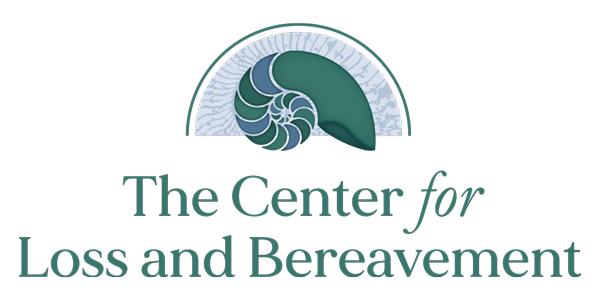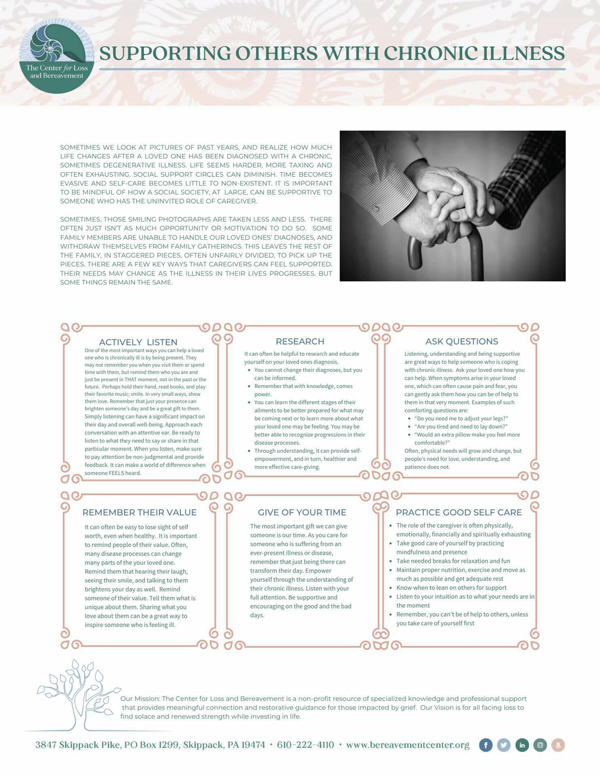CLB Tip Sheets
Supporting Others with Chronic Illness
Sometimes we look at pictures of past years, and realize how much life changes after a loved one has been diagnosed with a chronic, sometimes degenerative illness. Life seems harder, more taxing and often exhausting. Social support circles can diminish. Time becomes evasive and self-care becomes little to non-existent. It is important to be mindful of how a social society, at large, can be supportive to someone who has the uninvited role of caregiver.
Sometimes, those smiling photographs are taken less and less. There often just isn’t as much opportunity or motivation to do so. Some family members are unable to handle our loved ones’ diagnoses, and withdraw themselves from family gatherings. This leaves the rest of the family, in staggered pieces, often unfairly divided, to pick up the pieces. There are a few key ways that caregivers can feel supported. Their needs may change as the illness in their lives progresses, but somethings remain the same.
Actively Listen
One of the most important ways you can help a loved one who is chronically ill is by being present. They may not remember you when you visit them or spend time with them, but remind them who you are and just be present in THAT moment, not in the past or the future. Perhaps hold their hand, read books, and play their favorite music; smile. In very small ways, show them love. Remember that just your presence can brighten someone’s day and be a great gift to them. Simply listening can have a significant impact on their day and overall well-being. Approach each conversation with an attentive ear. Be ready to listen to what they need to say or share in that particular moment. When you listen, make sure to pay attention be non-judgmental and provide feedback. It can make a world of difference when someone FEELS heard.
Research
It can often be helpful to research and educate yourself on your loved ones diagnosis.
- You cannot change their diagnoses, but you can be informed.
- Remember that with knowledge, comes power.
- You can learn the different stages of their ailments to be better prepared for what may be coming next or to learn more about what your loved one may be feeling. You may be better able to recognize progressions in their disease processes.
- Through understanding, it can provide self-empowerment and in turn, healthier and more effective care-giving
Ask Questions
Listening, understanding and being supportive are great ways to help someone who is coping with chronic illness. Ask your loved one how you can help. When symptoms arise in your loved one which can often cause pain and fear, you can gently ask them how you can be of help to them in that very moment. Examples of such comforting questions are:
- “Do you need me to adjust your legs?”
- “Are you tired and need to lay down?”
- “Would an extra pillow make you feel more comfortable?”
Often, physical needs will grow and change, but people’s need for love, understanding, and patience does not.
Remember Their Value
It can often be easy to lose sight of self worth even when healthy. It is important to remind people of their value. Often, many disease processes can change many parts of the your loved one. Remind them that hearing their laugh, seeing their smile, and talking to them brightens your day as well. Remind someone of their value. Tell them what is unique about them. Sharing what you love about them can be a great way to inspire someone who is feeling ill.
Give of Your Time
The most important gift we can give someone is our time. As you care for someone who is suffering from an ever-present illness or disease, remember that just being there can transform their day. Empower yourself through the understanding of their chronic illness. Listen with your full attention. Be supportive and encouraging on the good and the bad days.
Practice Good Self Care
- The role of the caregjver is often physically, emotionally, financially and spiritually exhausting
- Take good care of yourself by practicing mindfulness and presence
- Take needed breaks for relaxation and fun
- Maintain proper nutrition 1 exercise and move as much as possible and get adequate rest
- Know when to lean on others for support
- Listen to your intuition as to what your needs are in the moment
- Remember, you can’t be of help to others, unless you take care of yourself first
Join Our
Mailing List
Donate
Today
Request
Information

Affiliations
• NACG
• CBEM Changemaker
• ADEC
• Charity Navigator
Quick Links
About Us
Individual & Family Grief Counseling
Volunteer
News
Grief Support Resources
Contact
Ph: 610-222-4110
Fax: 610-222-4116
3847 Skippack Pike
P.O. Box 1299
Skippack, PA 19474
Support The Center For
Loss and Bereavement
